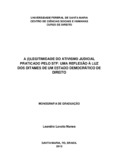| dc.contributor.advisor | Espindola, Angela Araujo da Silveira | |
| dc.creator | Nunes, Leandro Lovato | |
| dc.date.accessioned | 2017-05-29T03:57:06Z | |
| dc.date.available | 2017-05-29T03:57:06Z | |
| dc.date.issued | 2013-12-18 | |
| dc.date.submitted | 2013 | |
| dc.identifier.uri | http://repositorio.ufsm.br/handle/1/2947 | |
| dc.description | Trabalho de conclusão de curso (graduação) - Universidade Federal de Santa Maria, Centro de Ciências Sociais e Humanas, Curso de Direito, RS, 2013. | por |
| dc.description.abstract | Nowadays, the role evidenced by the judiciary is notorious, especially by the Supreme Court on the legal/social/political national scenario. This trend is due to the creation of a generalized imaginary in the sense that the effectiveness of the rights listed in the Constitution are made dependent on judicial answers, what causes the judicialization of politics. However, the biggest problem lies not in the role itself, given the political issues become judicialized, but in how the judicialized or not issues are decided. From this perspective, the scenario of judicial activism made appear the character of the "creative" judge that failing to find the desired response in the legislative framework, he decides according to his own conscience, even in dissonance with the integrity of the law. Therefore, becomes crucial to elucidate the legitimacy of the practice of judicial activism, which has discretionary contours which lead to arbitrariness. Everything being analyzed from a reflection according to the dictates of a democratic state. To this end, preliminary, possible semantic and factual connections between judicial activism and legalization of politics are removed. Further, the hermeneutical exercise uncompromising with the integrity of Law are explored, where solipsistic interpreters "cheat" the interpretive task and invoke several principles on the judicial speeches, without normativity. In another context, we analyze concrete cases tried by the Supreme Court. Finally, the need of creating a "decision theory" is instigated, with the purpose of breaking with the solipsistic discourse, in order to maintain the consistency and integrity of law, which are fundamental in a state that calls itself democratic. | eng |
| dc.language | por | por |
| dc.publisher | Universidade Federal de Santa Maria | por |
| dc.rights | Acesso Aberto | por |
| dc.subject | Ativismo judicial | por |
| dc.subject | Judicialização da política | por |
| dc.subject | Supremo Tribunal Federal | por |
| dc.subject | Estado democrático de direito | por |
| dc.subject | Judicial activism | eng |
| dc.subject | Judicialization of politics | eng |
| dc.subject | Supreme Court | eng |
| dc.subject | Democratic state of law | eng |
| dc.title | A (i)legitimidade do ativismo judicial praticado pelo STF: uma reflexão à luz dos ditames de um Estado Democrático de Direito | por |
| dc.title.alternative | The (il)legitimacy of judicial activism done by the supreme court: a reflection according to the Dictates of a Democratic State | eng |
| dc.type | Trabalho de Conclusão de Curso de Graduação | por |
| dc.degree.local | Santa Maria, RS, Brasil | por |
| dc.degree.graduation | Direito | por |
| dc.description.resumo | Atualmente é notório o protagonismo evidenciado pelo Poder Judiciário, especialmente pelo STF, no cenário jurídico/político/social nacional. Essa tendência é devida à criação de um imaginário generalizado no sentido de que a efetivação dos direitos elencados na Constituição se fazem dependentes de respostas judiciais, ocorrendo a judicialização da política. Porém, a problemática maior não reside no protagonismo em si, face às questões políticas serem judicializadas, mas sim, como as questões judidicializadas, ou não, são decididas. Nessa ótica, o cenário do ativismo judicial fez exsurgir a figura do julgador “criativo”, que ao não encontrar a resposta desejada no arcabouço legislativo positivado, decide conforme a sua consciência, mesmo em dissonância com a integridade do Direito. Mostra-se, portanto, fulcral a elucidação quanto à legitimidade da prática do ativismo judicial, o qual possui contornos de discricionariedade, que por sua vez conduzem à arbitrariedade. Tudo sendo analisado a partir de uma reflexão à luz dos ditames de um Estado Democrático de Direito. Para tanto, preliminarmente afastam-se possíveis conexões semânticas e fáticas entre ativismo judicial e judicialização da política. Na sequência, explora-se o exercício hermenêutico descomprometido com a integridade do Direito, onde os intérpretes solipsistas “fraudam” a tarefa interpretativa e invocam nos discursos judiciais princípios diversos, destituídos de normatividade. No outro quadro, analisam-se casos concretos julgados pelo STF. Por derradeiro, fomenta-se a necessidade da criação de uma “teoria da decisão”, com fins de romper com os discursos solipsistas, visando à manutenção da coerência e integridade do Direito, fundamental em um Estado que se diz democrático. | por |
| dc.publisher.unidade | Centro de Ciências Sociais e Humanas | por |


